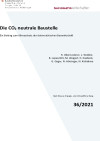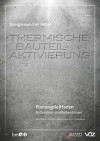Suchergebnisse
Serielle Sanierung für Häuser in Leichtbauweise
Die Sanierung von Ein- und Zweifamilienhäusern in Leichtbauweise in Österreich bietet ein großes Potenzial zur CO2-Einsparung. In diesem Forschungsprojekt wurde ein Sanierungskonzept auf Passiv- bzw. Plus-Energiehausstandard entwickelt, welches auf Serienfertigung abzielt und besonderes Augenmerk auf die Verwendung ökologischer Baustoffe legt.
Technical status of ventilation systems for buildings

Evaluation of existing ventilation systems in Austria considering technical quality and practicability.
LehB:klimafit! Live in existing buildings today: climate fit together
The aim of the project is to explore transferable renovation concepts for the implementation of climate-fit renovations in Vienna. Integrally optimized renovation packages will be developed, which will be optimized in the building ensembles for implementation-probable, climate-friendly overall solutions with the relevant stakeholders.
Die CO2 neutrale Baustelle - Ein Beitrag zum Klimaschutz der österreichischen Bauwirtschaft

Identifikation aller auf Baustellen anfallenden direkten und indirekten CO2- bzw. THG-Emissionen. Analyse der Rahmenbedingungen und Technologien, um Möglichkeiten für deren Steuerung aufzuzeigen. Gleichzeitig wurden Mehrwerte wie beispielsweise Kosten- und Nutzen-Vorteile einer CO2-neutralen Baustelle aufgezeigt und quantifiziert.
Schriftenreihe
36/2021
R. Obernosterer, L. Winkler, B. Lepuschitz, M. Weigert, H. Daxbeck, G. Goger, N. Hörzinger, N. Kisliakova
Herausgeber: BMK
Deutsch, 119 Seiten
Downloads zur Publikation
Catalogue of Passivhouse Details for Refurbishments
A Catalogue of Passivhouse Details for Refurbishments for buildings of all building periods from the 1870 to the 1980s. Special consideration to the refurbishment of building parts in contact with the earth. Integration of controlled ventilation services. Construction elements description with drawings, building physical data and ecological life cycle assessment. This project aimed at contributing to "Replicable refurbishment concepts for meeting passive house (or comparable) standard in buildings of all building periods".
SQUARE - Qualitätssicherung in der Gebäudesanierung
Entwicklung eines systematischen, flexiblen Qualitätsmanagements für Sanierungsprozesse. Es soll zu qualitativ hochwertigen Sanierungen führen, die sich in verbesserter Energieeffizienz und einem verbesserten Wohnraumklima von Wohngebäuden zeigen.
Energiespeicher Beton: Thermische Bauteilaktivierung. Planungsleitfaden Einfamilien- und Reihenhäuser

Im Planungsleitfaden "Heizen und Kühlen mit Beton" werden die Erkenntnisse bisheriger Forschungsprojekte zur Bauteilaktivierung zusammengefasst, es wird gezeigt, wie Energie in massiven Bauteilen über längere Zeit gespeichert und zu beliebigen Zeitpunkten wieder abgerufen werden kann. Der Planungsleitfaden ist mit detaillierten Anleitungen auf die Bedürfnisse von Planenden und Bauausführenden sowie auf die Wissensvermittlung zur Aus- und Weiterbildung konzipiert.
Felix Friembichler, Simon Handler, Klaus Krec, Harald Kuster
Herausgeber: BMVIT
Deutsch, 122 Seiten
Downloads zur Publikation
NeSt INT - Neue Standards für alte Häuser international
Ziel war die Marktaufbereitung für energetische Sanierung von Siedlungshäusern gemäß dem in "Haus der Zukunft" erstellten Sanierungsleitfaden "Neue Standards für alte Häuser" für den tschechischen und den slowakischen Markt. Dabei wurden in den östlichen Nachbarländern Potentiale erhoben, Erfahrungen ausgetauscht, Informationen weiter gegeben sowie Kontakte zu den Zielgruppen aufgebaut.
Spatial Energy Planning for Smart City Quarters and Smart Regions
In the project ERP_hoch3 energy related policy research in three Austrian agglomerations (Vienna – Lower Austria, Graz – Styria and Vorderland-Feldkirch) has been done, scenarios of the current state and the target state have been modelled and calculated. The aim was to develop generic transferable recommendations for spatial energy planning in agglomerations.
Technologie Portrait Energieeffiziente Gebäude (Juli 2002)

Das Technologie Portrait bietet einem Fachpublikum ebenso wie der interessierten Öffentlichkeit ein kompaktes Querschnittsbild des Technologiebereiches Energieeffiziente Gebäude.
Internationales Umweltzeichen für nachhaltige Bauprodukte
Zusammenführung der Prüfkriterien von anerkannten Umweltzeichen in Zusammenarbeit mit dem Baustoffhandel
PhaseOut - Wärmepumpentechnologien in der Bestandssanierung
Ziel ist die Konzeption, Optimierung, Umsetzung, Demonstration und Bewertung von innovativen, minimalinvasiven Sanierungslösungen (thermische Sanierung und Heizungstausch) mit Wärmepumpen und PV im Geschoßwohnbau an sieben baugleichen Gebäuden. Es erfolgt ein umfänglicher Vergleich verschiedener technischer Lösungsvarianten auf Basis modularer und skalierbarer Gebäudetechniksysteme sowie multifunktionaler Gebäudekomponenten für den Austausch von dezentralen Gasetagenheizungen durch zentrale, semi-zentrale und dezentrale Wärmepumpen-Lösungen.
BIGMODERN Subprojekt 2: Demonstrationsgebäude Amtshaus Bruck
Im Rahmen dieses Subprojekts wurde eine Entscheidungsmatrix sowie ein Planungshandbuch mit Machbarkeitsanalysen und Informationssammlungen, die als Entscheidungshilfe in den Planungs- und Ausführungsprozessen im Zuge nachhaltiger Gebäudemodernisierung dienen und so das Risiko bei der Anwendung neuer Technologien minimieren sollen.
Serial refurbishment for buildings in timber construction
Refurbishment of single- and two-familiy houses in timber construction in Austria has a large CO2-saving potential. To meet the special requirements for the refurbishment of timber constructions, a concept for the renovation to passive house respectively plus-energy house standard with special focus on ecologic construction materials was developed in this project.
Service packages for the ecological renovation of buildings

Services for a comprehensive ecological renovation should comprise advice, design and construction as well as "green" building assessment and innovative financing models. Such services are developed together with companies in the construction business and tested in pilot projects.
Baustelle SCHULE - Nachhaltige Sanierungsmodelle für Schulen
Im Forschungsprojekt wurden modellhafte Sanierungskonzepte für den Schulgebäudebestand entwickelt. Die Konzepte umfassen Maßnahmenkataloge zur Implementierung nachhaltiger Bautechnologien und Fallbeispiele für die Neuorganisation von Gebäuden verschiedener Typologien.
Formation of an Austrian EPD-Platform for building products
The objective of the project at hand was to create the general program guidelines for the "Austrian EPD-platform for building products": basic guidelines, general guidelines for LCA, general guideline for determination of emissions to indoor air and environment during operation phase.
HEROES - Houses for Energy- and ResOurce Efficient Settlements
A simplified method will be developed for the calculation of environmental indicators for so far not considered building elements (eg. constructions, which are not thermally relevant and HVAC-components). The theoretical principles for the calculation of the primary energy demand and the CO2-Emissions for operating and raising a building will be harmonized.
NEST international - New standards for old houses international
The main goal was to raise awareness for energetic renovations of settlement houses due to the handbook "Neue Standards für alte Häuser" in Slovakia and the Czech Republic. In doing so, the refurbishment potential has been identified in the target countries, experiences exchanged and information transferred. Contacts to the relevant target groups have been established.
Seniorenbezogene Konzepte für Neubau und Sanierung

Erarbeitung eines Kriterienkatalogs für die seniorengerechte Planung und konkrete Umlegung eines Neubau- bzw. eines Sanierungsprojektes in Wien 16; Kosten- und Vergleichsanalyse zwischen "normalem" Neubau bzw. "normaler" Sanierung und seniorengerechtem Neubau bzw. Sanierung
